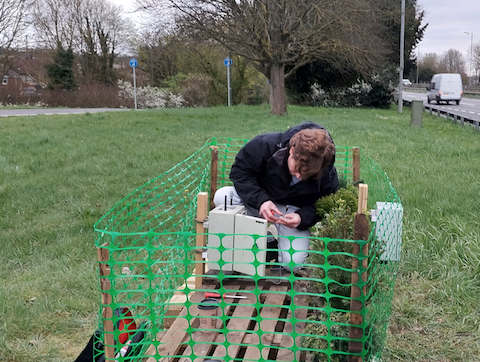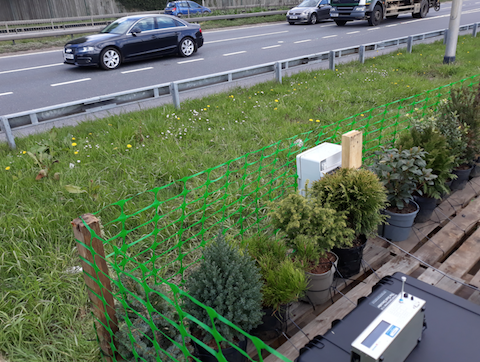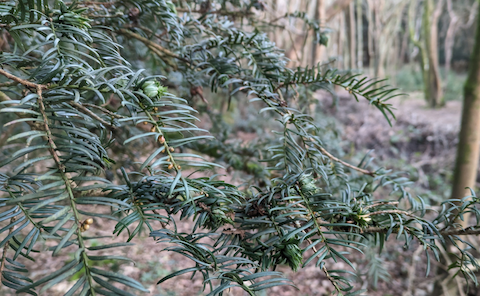 Abraham Lincoln
If given the truth, the people can be depended upon to meet any national crisis...
Abraham Lincoln
If given the truth, the people can be depended upon to meet any national crisis...
 Guildford news...
for Guildford people, brought to you by Guildford reporters - Guildford's own news service
Guildford news...
for Guildford people, brought to you by Guildford reporters - Guildford's own news service
Study Finds Evergreen Trees with Smaller Leaves Help Take Pollution Out of the Air
Published on: 20 Jan, 2024
Updated on: 23 Jan, 2024
A new study by the University of Surrey has found evergreen trees with smaller leaves help to take pollution out of the air.

Researcher Yendle Barwise assembling one of the pollution monitors beside the A3 in Guildford.
Researchers from the university’s Global Centre for Clean Air Research (GCARE) tested 10 trees beside a busy main road. They studied which caught the most particles of pollution and which best allowed the rain to wash those particles safely to the ground.
The university reports that it had been thought leaves with rougher surfaces and minute hairs would catch more pollutants. Yet that wasn’t borne out by the evidence.
Yendle Barwise, former forester and University of Surrey researcher, said: “When tackling air pollution, the ideal leaves cling on to particles when it’s windy – but let go of them in the rain. That means the wind blows less pollution back into the air – but rain can wash it safely to the ground.
“Being rough and hairy isn’t all it’s cracked up to be. To remove more particle pollutants over time, leaves need to be washed by rainfall, and it seems that the size and shape of the leaf is much more important from this perspective.”
According to the researchers, many planting projects use deciduous trees, which lose their leaves in winter – even though that’s when air pollution is worst in towns and cities.

The evergreen specimens in pots beside the A3.
For that reason, the scientists chose 10 evergreen specimens and placed them in pots beside the A3 in Guildford, where some 80,000 vehicles drive past every day.
Of those studied, yew (taxus baccata) was the plant which removed most air pollution. The most effective leaf types were awl-shaped. They were found on Japanese cedar (camellia japonica) and Lawson’s cypress (chamaecyparis lawsoniana).
The study also suggested that stomata – the “pores” of the leaf – could help plants “catch” particles.

Yew trees at Newlands Corner, Guildford.
For yew, more particles of pollution gathered on the porous underside of the leaf. That’s despite the other side of the leaf being 47% rougher, and despite previous research suggesting roughness mattered more.
Professor Prashant Kumar, founder of the University of Surrey’s Global Centre for Clean Air Research, said: “We’ve shown that smarter choice of plants can take even more pollution out of the air.
“We just studied the shapes and textures of the leaves themselves. Other factors, like the tree’s height, leaf chemistry, or how many trees you plant, could also make a big difference. Those are well worth investigating in the future.”
Responses to Study Finds Evergreen Trees with Smaller Leaves Help Take Pollution Out of the Air
Leave a Comment Cancel replyPlease see our comments policy. All comments are moderated and may take time to appear.
Recent Articles
- Guildford Institute’s Crowdfunding Project for Accessible Toilet in its New Community and Wellbeing Centre
- Letter: Guildford – Another Opportunity Missed?
- Letter: GBC’s Corporate Strategy – Where Is the Ambition?
- My Memories of John Mayall at a Ground-breaking Gig in Guildford Nearly Six Decades Ago
- Westborough HMO Plans ‘Losing the Heart of the Street’ Says Resident
- College Invests to Boost Surrey’s Economy and Close Digital Skills Gap
- Community Lottery Brings Big Wins for Local Charities
- GBC Housing Plan Promises ‘A Vibrant Urban Neighbourhood’ Near Town Centre
- Hospital Pillows ‘Shortage’ at the Royal Surrey
- Updated: Caravans Set Up Camp at Ash Manor School


Recent Comments
- Ian Macpherson on Updated: Main Guildford to Godalming Road Closed Until August 1
- Sara Tokunaga on GBC Housing Plan Promises ‘A Vibrant Urban Neighbourhood’ Near Town Centre
- Michael Courtnage on Daily Mail Online Reports Guildford Has Highest-paid Council Officer
- Alan Judge on GBC Housing Plan Promises ‘A Vibrant Urban Neighbourhood’ Near Town Centre
- John Perkins on GBC Housing Plan Promises ‘A Vibrant Urban Neighbourhood’ Near Town Centre
- S Collins on GBC Housing Plan Promises ‘A Vibrant Urban Neighbourhood’ Near Town Centre
Search in Site
Media Gallery
Dragon Interview: Local Artist Leaves Her Mark At One of England’s Most Historic Buildings
January 21, 2023 / No Comment / Read MoreDragon Interview: Lib Dem Planning Chair: ‘Current Policy Doesn’t Work for Local People’
January 19, 2023 / No Comment / Read MoreA3 Tunnel in Guildford ‘Necessary’ for New Homes, Says Guildford’s MP
January 10, 2023 / No Comment / Read More‘Madness’ for London Road Scheme to Go Ahead Against ‘Huge Opposition’, Says SCC Leader
January 6, 2023 / No Comment / Read MoreCouncillor’s Son Starts Campaign for More Consultation on North Street Plan
December 30, 2022 / No Comment / Read MoreCounty Council Climbs Down Over London Road Works – Further ‘Engagement’ Period Announced
December 14, 2022 / No Comment / Read MoreDragon Interview: GBC Reaction to the Government’s Expected Decision to Relax Housing Targets
December 7, 2022 / No Comment / Read MoreHow Can Our Town Centre Businesses Recover? Watch the Shop Front Debate
May 18, 2020 / No Comment / Read More









Sue Hackman
January 20, 2024 at 12:34 pm
Great local research. It gives us essential knowledge for developing hedges along cycle ways and pedestrian walkways, and comes at just the right moment as the county council upgrades provision for more sustainable travel.
Many main roads in Guildford have no kerbside planting to protect passers-by. Foliage is not just attractive, it is functional.
Sue Hackman is the campaign manager for Guildford Labour.
John Lomas
January 20, 2024 at 2:19 pm
Is this research going to remove the London Plane from it’s purported prominence as an anti particulate tree. Acoording to Wikipedia: “The London Plane is one of the most efficient trees in removing small particulate pollutants in urban areas”
David Roberts
January 21, 2024 at 5:40 pm
Another reason to grow native yew instead of the usual leylandii or laurel as hedging. It seems to love the chalk soil, especially on the south-facing side of the downs.
It is dense and slow-growing and can be pruned as hard as you like at any time of year and will always regenerate.
It also has lovely red berries. These are poisonous to pets and children, which I am not claiming is an added advantage.
Donna Collinson
January 24, 2024 at 6:25 pm
I totally agree with Mr Roberts. Grow yew instead of leylandi or laurel. However the Observers Book of Trees p182 – 183, says: “The Yew is a dioecious tree – one whose male and female blossoms are borne on separate trees. “Health and safety is important, so the councils can plant male trees to be safe.
The Woodland Trust website says much the same thing.
Looking forward to more hardy native evergreen Yew hedges and trees in Guildford. They do love our chalk soil and grow well also in town and in the River Wey valley.
Donna Collinson
January 22, 2024 at 5:57 pm
That evergreen native Yews take up the most particle pollution year-round is a much-needed scientific finding for a town of terrible traffic pollution. The Zero Carbon website states, “locations in Guildford from the A3/A25 to A3/A31 at times records the highest levels of air pollution in England!”
Let’s hope both GBC and SCC now plant Yew hedges in these areas and beyond. In town, SCC Councillor Angela Goodwin has done a fantastic job of helping residents secure extended 20mph residential areas via the “Various Roads in Guildford” project, which helps lower traffic pollution. This promotes more walking and cycling.
If both councils focus on a Yew hedge and tree planting project in the densely populated town area combined with 20 mph areas it would further improve air quality, reduce noise pollution, and further encourage walking and cycling.
It’s got to be good for Guildford!
John Lomas
January 25, 2024 at 8:14 pm
Planting more yew trees will also give us a green source of armaments in the future when we run out of powder and lead shot to repel the invaders which our military chiefs have started warning about.
We must just make sure we are also growing the straight timber for arrows and the goose quills for fletching.